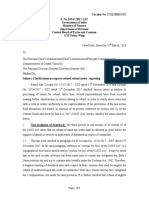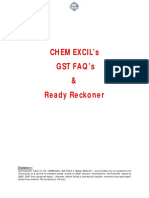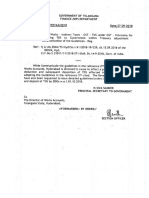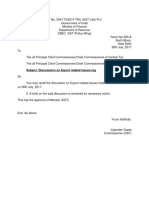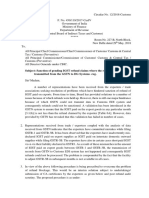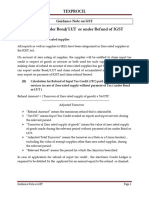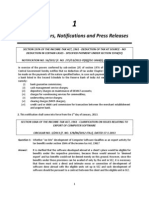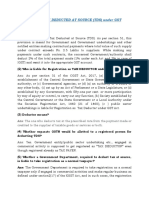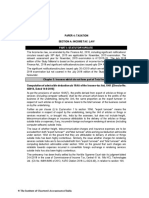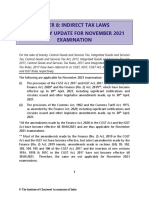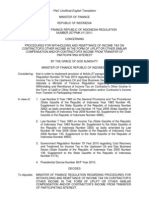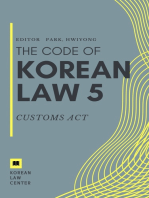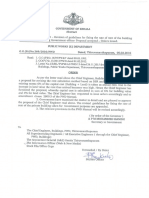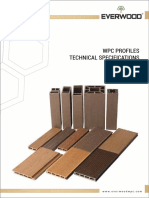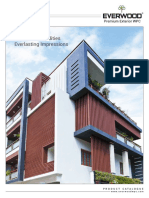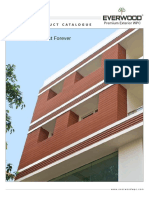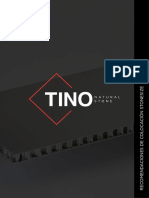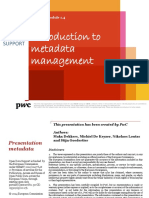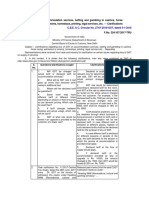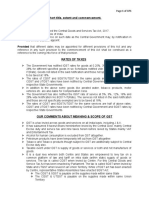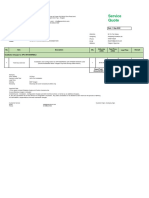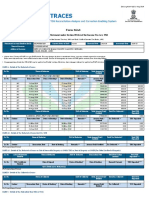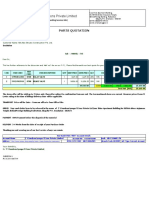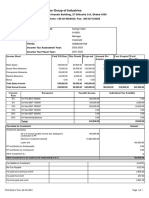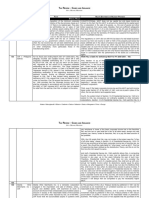Professional Documents
Culture Documents
Exports - Furnishing of Bond/Letter of Undertaking For Exports - Clarification
Exports - Furnishing of Bond/Letter of Undertaking For Exports - Clarification
Uploaded by
Rohan Kulkarni0 ratings0% found this document useful (0 votes)
170 views11 pages1. The document clarifies issues related to furnishing a bond or letter of undertaking (LUT) for exports without payment of integrated tax.
2. It replaces parts of an earlier circular to state that an LUT submitted online will be deemed accepted once an acknowledgement is generated, and no documents need to be submitted physically.
3. It aims to publicize these clarifications to facilitate exports under the goods and services tax (GST) regime in India.
Original Description:
Exports
Original Title
Export
Copyright
© © All Rights Reserved
Available Formats
DOCX, PDF, TXT or read online from Scribd
Share this document
Did you find this document useful?
Is this content inappropriate?
Report this Document1. The document clarifies issues related to furnishing a bond or letter of undertaking (LUT) for exports without payment of integrated tax.
2. It replaces parts of an earlier circular to state that an LUT submitted online will be deemed accepted once an acknowledgement is generated, and no documents need to be submitted physically.
3. It aims to publicize these clarifications to facilitate exports under the goods and services tax (GST) regime in India.
Copyright:
© All Rights Reserved
Available Formats
Download as DOCX, PDF, TXT or read online from Scribd
Download as docx, pdf, or txt
0 ratings0% found this document useful (0 votes)
170 views11 pagesExports - Furnishing of Bond/Letter of Undertaking For Exports - Clarification
Exports - Furnishing of Bond/Letter of Undertaking For Exports - Clarification
Uploaded by
Rohan Kulkarni1. The document clarifies issues related to furnishing a bond or letter of undertaking (LUT) for exports without payment of integrated tax.
2. It replaces parts of an earlier circular to state that an LUT submitted online will be deemed accepted once an acknowledgement is generated, and no documents need to be submitted physically.
3. It aims to publicize these clarifications to facilitate exports under the goods and services tax (GST) regime in India.
Copyright:
© All Rights Reserved
Available Formats
Download as DOCX, PDF, TXT or read online from Scribd
Download as docx, pdf, or txt
You are on page 1of 11
Exports — Furnishing of Bond/Letter of Undertaking for exports — Clarification
C.B.I. & C. Circular No. 40/14/2018-GST, dated 6-4-2018
F. No. 349/82/2017-GST
Government of India
Ministry of Finance (Department of Revenue)
Central Board of Indirect Taxes & Customs, New Delhi
Subject : Clarification on issues related to furnishing of Bond/Letter of Undertaking for exports - Regarding.
Various communications have been received from the field formations and exporters that the LUTs being
submitted online in FORM GST RFD-11 on the common portal are not visible to the jurisdictional officers of Central
Board of Indirect Taxes and Customs and of a few States. Therefore, a need was felt for a clarification regarding the
acceptance of LUTs being submitted online in FORM GST RFD-11.
2. Accordingly, in partial modification of Circular No. 8/8/2017-GST, dated 4th October, 2017, sub-paras (c),
(d) and (e) of para 2 of the said Circular are hereby replaced by the following :
“(c) Form for LUT : The registered person (exporters) shall fill and submit FORM GST RFD-11 on the
common portal. An LUT shall be deemed to be accepted as soon as an acknowledgement for the same, bearing
the Application Reference Number (ARN), is generated online.
(d) Documents for LUT : No document needs to be physically submitted to the jurisdictional office for
acceptance of LUT.
(e) Acceptance of LUT/bond : An LUT shall be deemed to have been accepted as soon as an
acknowledgement for the same, bearing the Application Reference Number (ARN), is generated online. If it is
discovered that an exporter whose LUT has been so accepted, was ineligible to furnish an LUT in place of bond
as per Notification No. 37/2017-Central Tax, then the exporter’s LUT will be liable for rejection. In case of
rejection, the LUT shall be deemed to have been rejected ab initio.”
3. It is requested that suitable trade notices may be issued to publicize the contents of this Circular.
4. Difficulty, if any, in the implementation of the above instructions may please be brought to the notice of the
Board. Hindi version would follow.
Export of goods — Furnishing of Bond/Letter of Under-taking for exports — Clarification
Circular No. 8/8/2017-GST, dated 4-10-2017
F. No. 349/74/2017-GST (Pt.) Vol. II
Government of India
Ministry of Finance (Department of Revenue)
Central Board of Excise & Customs, New Delhi
Subject : Clarification on issues related to furnishing of Bond/Letter of Undertaking for exports
In view of the difficulties being faced by the exporters in submission of bonds/Letter of Undertaking (LUT for
short) for exporting goods or services or both without payment of integrated tax, Notification No. 37/2017-Central Tax,
dated 4th October, 2017 has been issued which extends the facility of LUT to all exporters under rule 96A of the Central
Goods and Services Tax Rules, 2017 (hereafter referred to as “the CGST Rules”) subject to certain conditions and
safeguards. This notification has been issued in supersession of Notification No. 16/2017-Central Tax, dated 7th July,
2017 except as respects things done or omitted to be done before such supersession.
2. In the light of the new notification, three circulars in this matter, namely Circular No. 2/2/2017-GST, dated
5th July, 2017 [2017 (2) G.S.T.L. 313], Circular No. 4/4/2017-GST, dated 7th July, 2017 [2017 (2) G.S.T.L. 564] and
Circular No. 5/5/2017-GST, dated 11th August, 2017 [2017 (5) G.S.T.L. C21], which were issued for providing clarity
on the procedure to be followed for export under bond/LUT, now require revision and a consolidated circular on this
matter is warranted. Accordingly, to ensure uniformity in the procedure in this regard, the Board, in exercise of its
powers conferred under section 168(1) of the Central Goods and Services Tax Act, 2017 clarifies the following issues
:
(a) Eligibility to export under LUT : The facility of export under LUT has been now extended to all registered
persons who intend to supply goods or services for export without payment of integrated tax except those
who have been prosecuted for any offence under the CGST Act or the Integrated Goods and Services
Tax Act, 2017 or any of the existing laws and the amount of tax evaded in such cases exceeds two
hundred and fifty lakh rupees unlike Notification No. 16/2017-Central Tax, dated 7th July, 2017 which
extended the facility of export under LUT to status holder as specified in paragraph 5 of the Foreign Trade
Policy 2015-2020 and to persons receiving a minimum foreign inward remittance of 10% of the export
turnover in the preceding financial year which was not less than Rs. one crore.
(b) Validity of LUT : The LUT shall be valid for the whole financial year in which it is tendered. However, in
case the goods are not exported within the time specified in sub-rule (1) of rule 96A of the CGST Rules
and the registered person fails to pay the amount mentioned in the said sub-rule, the facility of export
under LUT will be deemed to have been withdrawn. If the amount mentioned in the said sub-rule is paid
subsequently, the facility of export under LUT shall be restored. As a result, exports, during the period
from when the facility to export under LUT is withdrawn till the time the same is restored, shall be either
on payment of the applicable integrated tax or under bond with bank guarantee.
(c) Form for bond/LUT : Till the time FORM GST RFD-11 is available on the common portal, the registered
person (exporters) may download the FORM GST RFD-11 from the website of the Central Board of Excise
and Customs (www.cbec.gov.in) and furnish the duly filled form to the jurisdictional Deputy/Assistant
Commissioner having jurisdiction over their principal place of business. The LUT shall be furnished on
the letterhead of the registered person, in duplicate, and it shall be executed by the working partner, the
Managing Director or the Company Secretary or the proprietor or by a person duly authorised by such
working partner or Board of Directors of such company or proprietor. The bond, wherever required, shall
be furnished on non-judicial stamp paper of the value as applicable in the State in which the bond is being
furnished.
(d) Documents for LUT : Self-declaration to the effect that the conditions of LUT have been fulfilled shall be
accepted unless there is specific information otherwise. That is, self-declaration by the exporter to the
effect that he has not been prosecuted should suffice for the purposes of Notification No. 37/2017-Central
Tax, dated 4th October, 2017. Verification, if any, may be done on post-facto basis.
(e) Time for acceptance of LUT/Bond : As LUT/Bond is a priori requirement for export, including exports
to a SEZ developer or a SEZ unit, the LUT/bond should be processed on top most priority. It is clarified
that LUT/bond should be accepted within a period of three working days of its receipt along with the self-
declaration as stated in para 2(d) above by the exporter. If the LUT/bond is not accepted within a period
of three working days from the date of submission, it shall deemed to be accepted.
(f) Bank guarantee : Since the facility of export under LUT has been extended to all registered persons,
bond will be required to be furnished by those persons who have been prosecuted for cases involving an
amount exceeding Rupees two hundred and fifty lakhs. A bond, in all cases, shall be accompanied by a
bank guarantee of 15% of the bond amount.
(g) Clarification regarding running bond : The exporters shall furnish a running bond where the bond
amount would cover the amount of self-assessed estimated tax liability on the export. The exporter shall
ensure that the outstanding integrated tax liability on exports is within the bond amount. In case the bond
amount is insufficient to cover the said liability in yet to be completed exports, the exporter shall furnish a
fresh bond to cover such liability. The onus of maintaining the debit/credit entries of integrated tax in the
running bond will lie with the exporter. The record of such entries shall be furnished to the Central tax
officer as and when required.
(h) Sealing by officers : Till mandatory self-sealing is operationalized, sealing of containers, wherever
required to be carried out under the supervision of the officer, shall be done under the supervision of the
central excise officer having jurisdiction over the place of business where the sealing is required to be
done. A copy of the sealing report would be forwarded to the Deputy/Assistant Commissioner having
jurisdiction over the principal place of business.
(i) Purchases from manufacturer and Form CT-1 : It is clarified that there is no provision for issuance of
CT-1 form which enables merchant exporters to purchase goods from a manufacturer without payment
of tax under the GST regime. The transaction between a manufacturer and a merchant exporter is in the
nature of supply and the same would be subject to GST.
(j) Transactions with EOUs : Zero rating is not applicable to supplies to EOUs and there is no special
dispensation for them under GST regime. Therefore, supplies to EOUs are taxable like any other taxable
supplies. EOUs, to the extent of exports, are eligible for zero rating like any other exporter.
(k) Realization of export proceeds in Indian Rupee : Attention is invited to para A(v) Part-I of RBI Master
Circular No. 14/2015-16, dated 1st July, 2015 (updated as on 5th November, 2015), which states that
“there is no restriction on invoicing of export contracts in Indian Rupees in terms of the Rules, Regulations,
Notifications and Directions framed under the Foreign Exchange Management Act, 1999. Further, in
terms of Para 2.52 of the Foreign Trade Policy (2015-2020), all export contracts and invoices shall be
denominated either in freely convertible currency or Indian rupees but export proceeds shall be realized
in freely convertible currency. However, export proceeds against specific exports may also be realized in
rupees, provided it is through a freely convertible Vostro account of a non-resident bank situated in any
country other than a member country of Asian Clearing Union (ACU) or Nepal or Bhutan”.
Accordingly, it is clarified that the acceptance of LUT for supplies of goods to Nepal or Bhutan or SEZ
developer or SEZ unit will be permissible irrespective of whether the payments are made in Indian
currency or convertible foreign exchange as long as they are in accordance with the applicable RBI
guidelines. It may also be noted that the supply of services to SEZ developer or SEZ unit under LUT will
also be permissible on the same lines. The supply of services, however, to Nepal or Bhutan will be
deemed to be export of services only if the payment for such services is received by the supplier in
convertible foreign exchange.
(l) Jurisdictional officer : In exercise of the powers conferred by sub-section (3) of section 5 of the CGST
Act, it is hereby stated that the LUT/Bond shall be accepted by the jurisdictional Deputy/Assistant
Commissioner having jurisdiction over the principal place of business of the exporter. The exporter is at
liberty to furnish the LUT/bond before either the Central Tax Authority or the State Tax Authority till the
administrative mechanism for assigning of taxpayers to the respective authority is implemented.
3. Circular No. 2/2/2017-GST, dated 5th July, 2017, Circular No. 4/4/2017-GST, dated 7th July, 2017 and
Circular No. 5/5/2017-GST, dated 11th August, 2017 are hereby rescinded except as respects things already done or
omitted to be done.
4. It is requested that suitable trade notices may be issued to publicize the contents of this circular.
5. Difficulty, if any, in implementation of the above instructions may please be brought to the notice of the
Board. Hindi version would follow.
Exports Bonds — Furnishing of Bond/Letter of Undertaking for Exports
Circular No. 5/5/2017-GST, dated 11-8-2017
F. No. 349/82/2017-GST
Government of India
Ministry of Finance (Department of Revenue)
Central Board of Excise & Customs, New Delhi
Subject : Clarification on issues related to furnishing of Bond/Letter of Undertaking for Exports - Regarding.
Please refer to Notification No. 16/2017-GST, dated 7th July, 2017 and Circular No. 2/2/2017-GST, dated 5th
July, 2017 [2017 (2) G.S.T.L. 313] and Circular No. 4/4/2017-GST, dated 7th July, 2017 [2017 (2) G.S.T.L. 564]. A
large number of communications have been received from the field formations and exporters citing variation in the
interpretation of above referred notification and circulars.
2. Therefore, in exercise of powers conferred under section 168(1) of the Central Goods and Services Tax
Act, 2017, for the purpose of uniformity in the implementation of the Act, following issues are being clarified hereunder
:
a. Eligibility to export under LUT : Notification No. 16/2017-Central Tax, dated 7th July, 2017 specifies
conditions to be fulfilled for export under Letter of Undertaking (LUT) in place of bond. In the extant Central
Excise provisions, LUTs were limited to manufacturer exporters only. The intent of the said notification is
to liberalize the facility of LUT and extend it to all kind of suppliers. It is hereby clarified that any registered
person who has received a minimum foreign inward remittance of 10% of export turnover in the preceding
financial year is eligible for availing the facility of LUT provided that the amount received as foreign inward
remittance is not less than Rs. one crore. This means that only such exporters are eligible to LUT facilities
who have received a remittance of Rs. one crore or 10% of export turnover, whichever is a higher amount,
in the previous financial year. A few illustrations are as follows :
i. An exporter had a turnover of Rs. 15 crore in the previous financial year. He would be eligible for
LUT facility if remittance received against this export is Rs. 1.5 crore or more (10% of export
turnover is more than Rs. 1 crore)
ii. An exporter had a turnover of Rs. 5 crore in the previous financial year. He would be eligible for
LUT facility if remittance received against this export is Rs. 1.0 crore or more (10% of export
turnover is less than Rs. 1 crore)
iii. An exporter has an export turnover of Rs. 2 crore. He has received Rs. 80 lacs as foreign inward
remittances in FY 2016-17 which is 40% of the export turnover. He will not be eligible for LUT facility
as remittance received is less than Rs. 1 crore.
iv. An exporter has export turnover of Rs. 40 crore. He has received Rs. 2 Crores as foreign inward
remittances in FY 2016-17 which is 5% of the export turnover. He will not be eligible for LUT facility
as remittance received is less than 10% of export turnover, even though it is in excess of Rs. 1
crore.
v. An exporter has received Rs. 1 Crore 10 lacs as foreign inward remittances in FY 2016-17 which is
20% of the export turnover. In this scenario, he will be eligible for LUT facility.
It may however be noted that a status holder as specified in paragraphs 3.20 and 3.21 of the Foreign
Trade Policy 2015-2020 is eligible for LUT facility regardless of whether he satisfies the above conditions.
b. Form for LUT : Bonds are furnished on non-judicial stamp paper, while LUTs are generally submitted on
the letterhead containing signature and seal of the person or the person authorized in this behalf as
provided in said Notification.
c. Time for acceptance of LUT/Bond : As LUT/bond is a priori requirement for export, including supplies
to a SEZ developer or a SEZ unit, the LUT/bond should be processed on top most priority and should be
accepted within a period of three working days from the date of submission of LUT/bond along with
complete documents by the exporter.
d. Purchases from manufacturer and form CT-1 : It is learnt that there is lack of clarity about treatment
of CT-1 form which was earlier used for purchase of goods by a merchant exporter from a manufacturer
without payment of central excise duty. The scheme holds no relevance under GST since transaction
between a manufacturer and a merchant exporter is in the nature of supply and the same has not been
exempted under GST even on submission of LUT/bond. Therefore, such supplies would be subject to
GST. The zero rating of exports, including supplies to SEZ, is allowed only with respect to supply by the
actual exporter under LUT/bond or payment of IGST.
e. Transactions with EOUs : Zero rating is not applicable to supplies to EOUs and there is no special
dispensation for them. Therefore, supplies to EOUs are taxable under GST just like any other taxable
supplies. The EOUs, to the extent of exports, are eligible for zero rating like any other exporter.
f. Forward inward remittance in Indian Rupee : Various representations have been received with respect
to receipts of proceeds of supplies in Indian Rupee especially with respect to exports to Nepal, Bhutan
and SEZ developer/SEZ unit. Attention is invited to Para A (v) Part-I of RBI Master Circular no. 14/2015-
16, dated July 1, 2015 (updated as on November 5, 2015), which states “there is no restriction on invoicing
of export contracts in Indian Rupees in terms of the Rules, Regulations, Notifications and Directions
framed under the Foreign Exchange Management Act, 1999. Further, in terms of Para 2.52 of the Foreign
Trade Policy (2015-2020), all export contracts and invoices shall be denominated either in freely
convertible currency or Indian rupees but export proceeds shall be realized in freely convertible currency.
However, export proceeds against specific exports may also be realized in rupees, provided it is through
a freely convertible Vostro account of a non-resident bank situated in any country other than a member
country of Asian Clearing Union (ACU) or Nepal or Bhutan”.
Accordingly, it is clarified that acceptance of LUT instead of a bond for supplies of goods to Nepal or
Bhutan or SEZ developer or SEZ unit will be permissible irrespective of whether the payments are made
in Indian currency or convertible foreign exchange as long as they are in accordance with applicable RBI
guidelines. It may also be noted that supply of services to SEZ developer or SEZ unit will also be
permissible on the same lines. The supply of services, however, to Nepal or Bhutan will be deemed to be
export of services only if the payment for such services is received by the supplier in convertible foreign
exchange.
g. Bank guarantee : Circular No. 4/4/2017, dated 7th July, 2017 provides that bank guarantee should
normally not exceed 15% of the bond amount. However, the Commissioner may waive off the requirement
to furnish bank guarantee taking into account the facts and circumstances of each case. It is expected
that this provision would be implemented liberally. Some of the instances of liberal interpretation are as
follows :
i. an exporter registered with recognized Export Promotion Council can be allowed to submit bond
without bank guarantee on submission of a self-attested copy of the proof of registration with a
recognized Export Promotion Council
ii. In the GST regime, registration is State-wise which means that the expression ‘registered person’
used in the said notification may mean different registered persons (distinct persons in terms of
sub-section (1) of section 25 of the Act) if a person having one Permanent Account Number is
registered in more than one State. It may so happen that a registered person may not satisfy the
condition regarding foreign inward remittances in respect of one particular registration, because of
splitting and accountal of receipts and turnover across different registered person with the same
PAN. But the total amount of inward foreign remittances received by all the registered persons,
having one Permanent Account Number, maybe Rs. 1 crore or more and it also maybe 10% or
more of total export turnover. In such cases, the registered person can be allowed to submit bond
without bank guarantee.
h. Jurisdictional officer : It has been clarified in Circular Nos. 2/2/2017-GST, dated 4th July, 2017 and
4/4/2017-GST, dated 7th July, 2017 that Bond/LUT shall be accepted by the jurisdictional
Deputy/Assistant Commissioner having jurisdiction over the principal place of business of the exporter.
The exporter is at liberty to furnish the bond/LUT before Central Tax Authority or State Tax Authority till
the administrative mechanism for assigning of taxpayers to respective authority is implemented. It is
reiterated that the Central Tax officers shall facilitate all exporters whether or not the exporter was
registered with the Central Government in the earlier regime.
i. Documents for LUT : Documents submitted as proof of fulfilling the conditions of LUT shall be accepted
unless there is any evidence to the contrary. Self-declaration shall be accepted unless there is specific
information otherwise. For example, a self-declaration by the exporter to the effect that he has not been
prosecuted should suffice for the purposes of notification No. 16/2017-Central tax, dated 7th July, 2017.
Verification, if any, may be done on post facto basis. Similarly, Status holder exporters have been given
the facility of LUT under the said notification and a self-attested copy of the proof of Status should be
sufficient.
j. Applicability of circulars on Bond/LUTs : It is learnt that some field officers have inferred that the
instructions given by the said circulars are effective in respect of exports made only from the date of its
issue despite the fact that it has been categorically clarified specifically in the said circular (dated 7th July,
2017) that the instructions shall be applicable for exports on or after 1st July, 2017. It is reiterated that the
instructions issued vide said circular and this circular are applicable to any export made on or after the
1st July, 2017.
3. It is requested that suitable trade notices may be issued to publicize the contents of this circular.
4. Difficulty, if any, in implementation of the above instructions may please be brought to the notice of the
Board. Hindi version would follow.
Export of goods — Furnishing of Letter of Undertaking in place of Bond for export without
payment of Integrated Tax — Clarification
GST Circular No. 4/4/2017-GST, dated 7-7-2017
F. No. 349/7582/2017-GST
Government of India
Ministry of Finance (Department of Revenue)
Central Board of Excise & Customs, New Delhi
Subject : Issues related to Bond/Letter of Undertaking for exports without payment of integrated tax -
Regarding.
Various communications have been received from the field formations and exporters that difficulties are being
faced in complying with the procedure prescribed for making exports of goods and services without payment of
integrated tax with respect to furnishing of bonds/Letter of Undertaking. Therefore, in exercise of powers conferred
under section 168(1) of the Central Goods and Services Tax Act, 2017, for the purpose of uniformity in the
implementation of the Act, these issues are being clarified hereunder.
2. As per rule 96A of the Central Goods and Services Tax Rules, 2017 (The CGST Rules), any registered
person exporting goods or services without payment of integrated tax is required to furnish a bond or a Letter of
Undertaking (LUT) in FORM GST RFD-11.
3. Attention is invited to Notification No. 16/2017-Central Tax, dated 1-7-2017 vide which the category of
exporters who are eligible to export under LUT has been specified along with the conditions and safeguards. All
exporters, not covered by the said notification, would submit bond. The procedure for submission and acceptance of
bond has already been prescribed vide circular No. 2/2/2017-GST, dated 4th July, 2017. The bond shall be furnished
on non-judicial stamp paper of the value as applicable in the State in which bond is being furnished.
4. A clarification has been sought as to whether bond to be furnished for exports is a running bond (with
debit/credit facility) or a one-time bond (separate bond for each consignment/export). It is observed consignment wise
bond would be a significant compliance burden on the exporters. It is directed that the exporters shall furnish a running
bond, in case he is required to furnish a bond, in FORM GST RFD-11. The bond would cover the amount of tax involved
in the export based on estimated tax liability as assessed by the exporter himself. The exporter shall ensure that the
outstanding tax liability on exports is within the bond amount. In case the bond amount is insufficient to cover the tax
liability in yet to be completed exports, the exporter shall furnish a fresh bond to cover such liability.
5. FORM RFD-11 under rule 96A of the CGST Rules requires furnishing a bank guarantee with bond. Field
formations have requested for clarity on the amount of bank guarantee as a security for the bond. In this regard it is
directed that the jurisdictional Commissioner may decide about the amount of bank guarantee depending upon the
track record of the exporter. If Commissioner is satisfied with the track record of an exporter then furnishing of bond
without bank guarantee would suffice. In any case the bank guarantee should normally not exceed 15% of the bond
amount.
6. As regards LUT, it is clarified that it shall be valid for twelve months. If the exporter fails to comply with the
conditions of the LUT he may be asked to furnish a bond. Exports may be allowed under existing LUTs/Bonds till 31st
July 2017. Exporters shall submit the LUTs/bond in the revised format latest by 31st July, 2017.
7. It is further stated that the Bond/LUT shall be accepted by the jurisdictional Deputy/Assistant Commissioner
having jurisdiction over the principal place of business of the exporter. The exporter is at liberty to furnish the bond/LUT
before Central Tax Authority or State Tax Authority till the administrative mechanism for assigning of taxpayers to
respective authority is implemented. However, if in a State, the Commissioner of State Tax so directs, by general
instruction, to exporter, the Bond/LUT in all cases be accepted by Central tax officer till such time the said administrative
mechanism is implemented. Central Tax officers are directed to take every step to facilitate the exporters.
8. Attention is further invited to circular No. 26/2017-Customs dated 1st July 2017, vide which it has been
clarified that the existing practice of sealing the container with a bottle seal under Central Excise supervision or
otherwise would continue till 1st September, 2017. Such sealing shall be done under the supervision of the officer
having physical jurisdiction over the place of business where the sealing is being done. A copy of the sealing report
would be forwarded to the Deputy/Assistant Commissioner having jurisdiction over the principal place of business.
9. These instructions shall apply to exports on or after 1st July, 2017. It is requested that suitable trade notices
may be issued to publicize the contents of this circular. Difficulty, if any, in the implementation of the above instructions
may please be brought to the notice of the Board. Hindi version would follow.
Furnishing of Bond/Letter of Undertaking for Exports — Clarification
Circular No. 2/2/2017-GST, dated 4-7-2017
F. No. 349/82/2017-GST
Government of India
Ministry of Finance (Department of Revenue)
Central Board of Excise & Customs, New Delhi
Subject : Issues related to furnishing of Bond/ Letter of Undertaking for Exports - Regarding.
Various communications have been received from the field formations and exporters on the issue of difficulties
being faced while supplying the goods or services for export without payment of integrated tax and filing the FORM
GST RFD-11 on the common portal (www.gst.gov.in), because of which exports are being held up.
2. Whereas, as per rule 96A of the Central Goods and Services Tax Rules, 2017, any registered person
availing the option to supply goods or services for export without payment of integrated tax shall furnish, prior to export,
a Bond or a Letter of Undertaking. This Bond or Letter of Undertaking is required to be furnished in FORM GST RFD-
11 on the common portal. Further, Circular No. 26/2017-Customs, dated 1st July, 2017 has clarified that the procedure
as prescribed under rule 96A of the said rules requires to be followed for the export of goods from 1st July, 2017.
3. Another issue being raised by various stakeholders is that the Bond/Letter of Undertaking is required to be
given through the proper officer which is to be furnished to the jurisdictional Commissioner as per sub-rule (1) of rule
96A of the said rules. Taking cognizance of the fact that a large number of such Bonds/Letter of Undertakings would
be required to be filed by the registered exporters who would be located at a distance from the office of the jurisdictional
Commissioner, it is understood that the furnishing of such bonds/undertakings before the jurisdictional Commissioner
may cause hardship to the exporters.
4. Thus, in exercise of the powers conferred by sub-section (3) of section 5 of the CGST Act, 2017, it is hereby
stated that the acceptance of the Bond/Letter of Undertaking required to be furnished by the exporter under rule 96A
of the said rules shall be done by the jurisdictional Deputy/Assistant Commissioner.
5. Further, in exercise of the powers conferred by section 168 of the said Act, for the purpose of uniformity in
the implementation of the said Act, the Bond/Letter of Undertaking required to be furnished under rule 96A of the said
rules may be furnished manually to the jurisdictional Deputy/Assistant Commissioner in the format specified in FORM
RFD-11 till the module for furnishing of FORM RFD-11 is available on the common portal. The exporters may download
the FORM GST RFD-11 from the website of the Central Board of Excise and Customs (www.cbec.gov.in) and furnish
the duly filled form to the jurisdictional Deputy/Assistant Commissioner.
6. The above specified provisions shall be applicable to all applications which have been filed on or after 1st
July, 2017. It is requested that suitable trade notices may be issued to publicize the contents of this circular.
7. Difficulty, if any, in the implementation of the above instructions may please be brought to the notice of the
Board. Hindi version would follow.
Deemed Exports in GST
C.B.E. & C. Flyer No. 25, dated 1-1-2018
Introduction
“Deemed Exports” refers to supplies of goods manufactured in India (and not services) which are notified as
deemed exports under Section 147 of the CGST/SGST Act, 2017. The supplies do not leave India. The payment for
such supplies is received either in Indian rupees or in convertible foreign exchange.
Deemed exports are not zero rated supplies by default, unlike the regular exports. Hence all supplies notified
as supply for deemed export will be subject to levy of taxes i.e. such supplies can be made on payment of tax and
cannot be supplied under a Bond/LUT. However, the refund of tax paid on the supply regarded as Deemed export is
admissible to either the supplier or the recipient. The application for refund has to be filed by the supplier or recipient
(subject to certain conditions) of deemed export supplies, as the case may be.
Categories of supply of goods notified as Deemed Exports
In exercise of powers conferred under Section 147 of the CGST Act, the Central Government has issued
Notification No. 48/2017-Central Tax, dated 18-10-2017 wherein the following categories of supply of goods has been
declared as Deemed Exports :-
Sr. No. Description of Supply
1 Supply of goods by a registered person against Advance Authorisation
2 Supply of capital goods by a registered person against Export Promotion Capital Goods Authorisation
3. Supply of goods by a registered person to Export Oriented Unit
4. Supply of gold by a bank or Public Sector Undertaking specified in the notification No. 50/2017-Customs,
dated the 30th June, 2017 (as amended) against Advance Authorisation
For the purposes of the above notification, -
1. “Advance Authorisation” means an authorisation issued by the Director General of Foreign Trade under
Chapter 4 of the Foreign Trade Policy 2015-20 for import or domestic procurement of inputs on pre-import
basis for physical exports.
2. Export Promotion Capital Goods Authorisation means an authorisation issued by the Director General of
Foreign Trade under Chapter 5 of the Foreign Trade Policy 2015-20 for import of capital goods for physical
exports.
3. “Export Oriented Unit” means an Export Oriented Unit or Electronic Hardware Technology Park Unit or
Software Technology Park Unit or Bio-Technology Park Unit approved in accordance with the provisions
of Chapter 6 of the Foreign Trade Policy 2015-20.
It may be noted that Notification no. 49/2017-Central tax, dated 18-10-2017 also lays down the list of evidences which
are required to be produced by the supplier of deemed export supplies for claiming refund.
Procedure to be followed in case of Deemed Export supplies
Rule 89 of the CGST Rules, 2017 as amended vide Notification No. 47/2017-Central Tax, dated 18-10-2017
allows either the recipient or supplier of such supplies to claim refund of tax paid thereon.
As mentioned earlier, certain supplies of goods have been notified as deemed export supplies vide Notification
No. 48/2017-Central Tax, dated 18-10-2017. Circular no. 14/14/2017-GST, dated 6-11-2017 provides for the following
procedure and safeguards in respect of supplies to EOU/EHTP/STP/BTP units-
i. The recipient EOU/EHTP/STP/BTP unit shall give prior intimation in a prescribed proforma in “Form-A”
(appended herewith) bearing a running serial number containing the goods to be procured, as pre-
approved by the Development Commissioner and the details of the supplier before such deemed export
supplies are made. The said intimation shall be given to -
(a) the registered supplier;
(b) the jurisdictional GST officer in charge of such registered supplier; and
(c) its jurisdictional GST officer.
The registered supplier thereafter will supply goods under tax invoice to the recipient
EOU/EHTP/STP/BTP unit.
ii. On receipt of such supplies, the EOU/EHTP/STP/BTP unit shall endorse the tax invoice and send a copy
of the endorsed tax invoice to -
(a) the registered supplier;
(b) the jurisdictional GST officer in charge of such registered supplier; and
(c) its jurisdictional GST officer.
iv. The endorsed tax invoice will be considered as proof of deemed export supplies by the registered person
to EOU/EHTP/STP/BTP unit.
v. The recipient EOU/EHTP/STP/BTP unit shall maintain records of such deemed export supplies in digital
form, based upon data elements contained in “Form-B” (appended herewith). The software for
maintenance of digital records shall incorporate the feature of audit trail. While the data elements
contained in the Form-B are mandatory, the recipient units will be free to add or continue with any
additional data fields, as per their commercial requirements. All recipient units are required to enter data
accurately and immediately upon the goods being received in, utilized by or removed from the said unit.
The digital records should be kept updated, accurate, complete and available at the said unit at all times
for verification by the proper officer, whenever required. A digital copy of Form-B containing transactions
for the month, shall be provided to the jurisdictional GST officer, each month (by the 10th of month) in a
CD or Pen drive, as convenient to the said unit.
3. The above procedure and safeguards are in addition to the terms and conditions to be adhered to by a
EOU/EHTP/STP/BTP unit in terms of the Foreign Trade Policy, 2015-20 and the duty exemption
notification being availed by such unit.
Form-A
[Intimation for procurement of supplies from the registered person by Export Oriented Unit (EOU)/Electronic
Hardware Technology Park (EHTP) Unit/Software Technology Park (STP) unit/Bio-Technology Parks (BTP)
Unit under deemed export benefits under section 147 of CGST Act, 2017 read with Notification No. 48/2017-
Central Tax, dated 18-10-2017]
(as per Circular…………………….……………………….…………… dated………………………)
Running Sr. No. of intimation and Date………………………………………………………………
LOP No. …………………………………………….. and valid up to ………………………………..
GSTIN ………………………………….
We the, M/s. ………………………………………………………………...… (Name of EOU/EHTP/
STP/BTP unit and address) wish to procure the Goods namely(Tariff description, Quantity and value)
……………………………….. as allowed under Foreign Trade Policy and Handbook of Procedures 2015-2020,
and approved by Development Commissioner from M/s. ……………….. …………………… [Name of supplier,
address and Goods & Services Tax Identification Number (GSTIN)]. Such supplies on receipt would be used in
manufacturing of goods or rendering services by us. We would also abide by procedure set out in Circular
no………. dated …………………….
Signatures of the
owner of
EOU/EHTP/STP/BT
P unit or
His Authorised
officer
To :
1. The GST officer having Jurisdiction over the EOU/EHTP/STP/BTP unit.
2. The GST officer having Jurisdiction over the registered person intending to supply the goods.
3. The registered person intending to supply goods to EOU/EHTP/STP/BTP unit.
FORM-B
Form to be maintained by EOU/EHTP/STP/BTP unit for the receipt, use and removal of goods received under
deemed export benefit under section 147 of CGST Act, 2017 read with Notification No. 48/2017-Central Tax,
dated 18-10-2017
Name of EOU/EHTP/STP/BTP unit and address
GSTIN No.
Address of Jurisdiction GST Officer
Who can file refund application in case of Deemed Exports supplies
As per 3rd proviso to Rule 89(1) of CGST Rules, 2017, application for refund in case of deemed exports
can either be filed by the recipient of deemed export supplies. Alternatively, the supplier of such deemed exports
supplies can also file the refund application, in cases where the recipient does not avail of input tax credit on
such supplies and furnishes an undertaking to the effect that the supplier may claim the refund.
It may be noted that rule 89(4A) of the CGST Rules, 2017 as amended vide Notification no. 75/2017-
Central Tax, dated 29-12-2017 (w.e.f. 23-10-2017), the recipient of deemed export supplies can claim refund of
input tax credit availed in respect of other inputs or input services used in making zero-rated supply of goods or
services or both, in case of deemed export supplies on which the supplier has availed the benefit of notification
No. 48/2017-Central Tax, dated 18-10-2017.
Further Rule 96(9) of the CGST Rules, 2017 as amended vide Notification no. 75/2017-Central Tax,
dated 29-12-2017 (w.e.f. 23-10-2017) also provides that the recipient of deemed export supplies on which the
supplier has availed the benefit of notification No. 48/2017-Central Tax, dated 18-10-2017 cannot export on
payment of integrated tax.
Time Limit for filing refund claim
For obtaining refund the recipient or supplier of deemed export supplies has to file an application in
FORM GST RFD-01 through the Common Portal, either directly or through a Facilitation Centre notified by the
Commissioner before the expiry of two years from, the date on which the return relating to such deemed export
supplies is to be furnished electronically. The application has to be accompanied by a statement containing the
number and date of invoices along with such other evidences as may be notified in this behalf.
Manual filing and processing of refund claims on account of deemed export supplies
Due to the non-availability of the refund module on the common portal, it has been decided by the
competent authority, that the applications/documents/forms pertaining to refund claims on account of deemed
export supplies shall be filed and processed manually till further orders. Circular No. 17/17/2017-GST, dated
15-11-2017 and Circular no. 24/24/2017-GST, dated 21-12-2017 prescribing the detailed procedure have been
issued in this regard.
DEPARTMENTAL CLARI FICATION S — CBE C FLYERS/LEAFLE TS ON I MPORTANT G ST TOPICS & PROCEDU RES
You might also like
- Woolworth Payslip 2Document1 pageWoolworth Payslip 2sunny singh100% (1)
- Taxation Reviewer PicpaDocument29 pagesTaxation Reviewer PicpaMike Antolino50% (2)
- Page 1 of 8Document8 pagesPage 1 of 8Faiqa HamidNo ratings yet
- Exports Under GSTDocument5 pagesExports Under GSTphani raja kumarNo ratings yet
- Circular No.63Document10 pagesCircular No.63Shrikant KulkarniNo ratings yet
- Circ26 2017csDocument11 pagesCirc26 2017csDevdas NairNo ratings yet
- Circular No 211 05 2024Document4 pagesCircular No 211 05 2024हिनयकुमार मारुती सोनकवडेNo ratings yet
- Circular No.45Document5 pagesCircular No.45Hr legaladviserNo ratings yet
- Deemed Exports in GSTDocument3 pagesDeemed Exports in GSTBharat JainNo ratings yet
- Chemexcil GST FAQsDocument230 pagesChemexcil GST FAQssrinivas100% (1)
- GST Flyer Chapter25Document9 pagesGST Flyer Chapter25S Radhakrishna BhandaryNo ratings yet
- Memo No 1304Document8 pagesMemo No 1304chandra shekharNo ratings yet
- 2KU CBEC Policy Wing Clarifications Dated 26-07-2017 On Export Related Issues On LUT Bond Bank Gurantee EOUs SEZsDocument4 pages2KU CBEC Policy Wing Clarifications Dated 26-07-2017 On Export Related Issues On LUT Bond Bank Gurantee EOUs SEZsSantosh JaiswalNo ratings yet
- Subject: Sanction of Pending IGST Refund Claims Where The Records Have Not Been Transmitted From The GSTN To DG Systems - RegDocument4 pagesSubject: Sanction of Pending IGST Refund Claims Where The Records Have Not Been Transmitted From The GSTN To DG Systems - RegSanjay ChandelNo ratings yet
- Circular No 70 - NewDocument3 pagesCircular No 70 - NewHr legaladviserNo ratings yet
- Circular No.60Document4 pagesCircular No.60Hr legaladviserNo ratings yet
- GST Circular PDFDocument11 pagesGST Circular PDFNavnera divisionNo ratings yet
- Bos 32722 P 4Document37 pagesBos 32722 P 4CmaChanduNo ratings yet
- Part I: Statutory Update: © The Institute of Chartered Accountants of IndiaDocument41 pagesPart I: Statutory Update: © The Institute of Chartered Accountants of IndiaApeksha ChilwalNo ratings yet
- Texprocil: Guidance Note On GSTDocument7 pagesTexprocil: Guidance Note On GSTChinmoy BaruahNo ratings yet
- Circular No 58-2004Document6 pagesCircular No 58-2004Nagendra KumarNo ratings yet
- Tax HDocument15 pagesTax HDeepesh SinghNo ratings yet
- Circularno 24 CGSTDocument4 pagesCircularno 24 CGSTHr legaladviserNo ratings yet
- Latest Circulars, Notifications and Press Releases: 2. This Notification Shall Come Into Force From The 1Document0 pagesLatest Circulars, Notifications and Press Releases: 2. This Notification Shall Come Into Force From The 1Ketan ThakkarNo ratings yet
- Refund Under GST Regime Up To Date 12-03-2021 Detailed AnalysisDocument17 pagesRefund Under GST Regime Up To Date 12-03-2021 Detailed AnalysisChaithanya RajuNo ratings yet
- AP SGST Rules 2017Document88 pagesAP SGST Rules 2017vejjuvinaykumarNo ratings yet
- Office of Commissioner of Customs Ns-Iv Jawahar Lal Nehru Custom House, Nhava Sheva Tal: Uran, Dist. Raigad, Maharashtra-400707Document4 pagesOffice of Commissioner of Customs Ns-Iv Jawahar Lal Nehru Custom House, Nhava Sheva Tal: Uran, Dist. Raigad, Maharashtra-400707Huzaifa JariwalaNo ratings yet
- 51198bos40905 cp4 PDFDocument41 pages51198bos40905 cp4 PDFShubham VyasNo ratings yet
- FAQsonTDS 230221 120909Document8 pagesFAQsonTDS 230221 120909Bharath UGNo ratings yet
- Taxflash 2019 01Document4 pagesTaxflash 2019 01Haryo BagaskaraNo ratings yet
- Circular No.61Document2 pagesCircular No.61IAS MeenaNo ratings yet
- GST Invoice Rules, GST Tax Invoice, Download GST Invoice FormatDocument6 pagesGST Invoice Rules, GST Tax Invoice, Download GST Invoice Formatiiftgscm batch2No ratings yet
- ST ND: 1 - Ca Shubham Khaitan S.Khaitan and AssociatesDocument9 pagesST ND: 1 - Ca Shubham Khaitan S.Khaitan and AssociatesTaruna BajajNo ratings yet
- Advance Authorization SchemeDocument9 pagesAdvance Authorization SchemeVedant CorporationNo ratings yet
- Circular CGST 88Document8 pagesCircular CGST 88sanjitaNo ratings yet
- Custom Circulars Guidance NoteDocument30 pagesCustom Circulars Guidance NoteAltafNo ratings yet
- Circular No. 162 - 18 - 2021 - GSTDocument4 pagesCircular No. 162 - 18 - 2021 - GSTRamesh GoddumariNo ratings yet
- ChechiDocument15 pagesChechidishu kumarNo ratings yet
- RMO No. 43-2020Document4 pagesRMO No. 43-2020Miming BudoyNo ratings yet
- GST & Customs II Unit 1Document11 pagesGST & Customs II Unit 1GagandeepNo ratings yet
- CB Licence-Suspension-RenewalDocument3 pagesCB Licence-Suspension-RenewalraviNo ratings yet
- Section 16 of CGST Act 2017 - Eligibility & Conditions For Taking Input Tax Credit - Taxguru - inDocument3 pagesSection 16 of CGST Act 2017 - Eligibility & Conditions For Taking Input Tax Credit - Taxguru - inDHANNNo ratings yet
- Chapter 7 Input Tax Credit Under GSTDocument28 pagesChapter 7 Input Tax Credit Under GSTDR. PREETI JINDALNo ratings yet
- Input Tax Credit: Cma Bibhudatta SarangiDocument3 pagesInput Tax Credit: Cma Bibhudatta SarangihanumanthaiahgowdaNo ratings yet
- Certification DraftDocument47 pagesCertification DraftndNo ratings yet
- RR No. 34-2020 v2Document3 pagesRR No. 34-2020 v2Boss NikNo ratings yet
- Nov 2019Document39 pagesNov 2019amitha g.sNo ratings yet
- Cir 180 08 2022 CGSTDocument8 pagesCir 180 08 2022 CGSTveer_bcaNo ratings yet
- Circular Refund 147-1.5 Times RefundDocument5 pagesCircular Refund 147-1.5 Times Refundbanerjeeankita13No ratings yet
- Circular Refund 137 7 2020Document3 pagesCircular Refund 137 7 2020Shirish JainNo ratings yet
- Trade Notice No 10-CGST & CX-MUMBAI Zone-2021 Dated 22september2021Document6 pagesTrade Notice No 10-CGST & CX-MUMBAI Zone-2021 Dated 22september2021Gautam jainNo ratings yet
- Statutory Updates For Nov-21 ExamsDocument50 pagesStatutory Updates For Nov-21 ExamsShodasakshari VidyaNo ratings yet
- Circular No. 36 /2020-CustomsDocument16 pagesCircular No. 36 /2020-CustomsAshok KumarNo ratings yet
- CGST Act 16-21Document37 pagesCGST Act 16-21Dasari NareshNo ratings yet
- SEZ & Applicability of RCMDocument4 pagesSEZ & Applicability of RCMyashNo ratings yet
- Cir 187 19 2022 CGSTDocument3 pagesCir 187 19 2022 CGSTAtanu Kumar SenNo ratings yet
- Customs & GST Ii Assignment: U P & E S SDocument16 pagesCustoms & GST Ii Assignment: U P & E S SSonal AgarwalNo ratings yet
- 48th MeetingDocument6 pages48th Meetingrejin.auditorNo ratings yet
- Indonesia Tax HolidayDocument18 pagesIndonesia Tax HolidayastridnoviantoNo ratings yet
- GST Update130 PDFDocument3 pagesGST Update130 PDFTharun RajNo ratings yet
- Do You Know GST - August 2021Document11 pagesDo You Know GST - August 2021CA Ranjan MehtaNo ratings yet
- IndexDocument8 pagesIndexRohan KulkarniNo ratings yet
- Ijiset V4 I12 16Document20 pagesIjiset V4 I12 16Rohan KulkarniNo ratings yet
- Toaz - Info A Textbook of Vastuvidya Prabhu 1996 PRDocument271 pagesToaz - Info A Textbook of Vastuvidya Prabhu 1996 PRRohan KulkarniNo ratings yet
- RGM 2Document8 pagesRGM 2Rohan KulkarniNo ratings yet
- Precitool Cat FRDocument44 pagesPrecitool Cat FRRohan KulkarniNo ratings yet
- We Are Intechopen, The World'S Leading Publisher of Open Access Books Built by Scientists, For ScientistsDocument22 pagesWe Are Intechopen, The World'S Leading Publisher of Open Access Books Built by Scientists, For ScientistsRohan KulkarniNo ratings yet
- Us 4909638Document7 pagesUs 4909638Rohan KulkarniNo ratings yet
- CA2426567A1Document32 pagesCA2426567A1Rohan KulkarniNo ratings yet
- US5145692Document14 pagesUS5145692Rohan KulkarniNo ratings yet
- Public Works Department - Revision of Guidelines For Fixing The Rate of The Building Taken For Accommodating Government Officers-Proposal Accorded - Orders IssuedDocument9 pagesPublic Works Department - Revision of Guidelines For Fixing The Rate of The Building Taken For Accommodating Government Officers-Proposal Accorded - Orders Issuedapi-320179740No ratings yet
- Break Away Fire Release Connectors Sample DesignsDocument5 pagesBreak Away Fire Release Connectors Sample DesignsRohan KulkarniNo ratings yet
- 5826 BR 9307 9311 2016 en AtiDocument9 pages5826 BR 9307 9311 2016 en AtiRohan KulkarniNo ratings yet
- Final 175T Crane Spec DT 11.1.16 PDFDocument57 pagesFinal 175T Crane Spec DT 11.1.16 PDFRohan KulkarniNo ratings yet
- E3sconf Form2018 04012Document6 pagesE3sconf Form2018 04012Rohan KulkarniNo ratings yet
- Pennar Industries Limited: Engineering ExcellenceDocument12 pagesPennar Industries Limited: Engineering ExcellenceRohan Kulkarni100% (1)
- WPC Profiles Technical Specifications and FaqsDocument6 pagesWPC Profiles Technical Specifications and FaqsRohan KulkarniNo ratings yet
- Final 175T Crane Spec DT 11.1.16 PDFDocument57 pagesFinal 175T Crane Spec DT 11.1.16 PDFRohan KulkarniNo ratings yet
- Your Imagination, Our Composites.: Pergolas & Finsproduct CatalogueDocument5 pagesYour Imagination, Our Composites.: Pergolas & Finsproduct CatalogueRohan KulkarniNo ratings yet
- Endless Possibilities Everlasting Impressions: Product CatalogueDocument32 pagesEndless Possibilities Everlasting Impressions: Product CatalogueRohan Kulkarni100% (1)
- Good Things Last Forever: Cladding Product CatalogueDocument4 pagesGood Things Last Forever: Cladding Product CatalogueRohan KulkarniNo ratings yet
- Stonesize Installation ENGDocument7 pagesStonesize Installation ENGRohan KulkarniNo ratings yet
- PRD Manual Articulated Trolleys Technical GuideDocument1 pagePRD Manual Articulated Trolleys Technical GuideRohan KulkarniNo ratings yet
- Fact SheetDocument1 pageFact SheetRohan KulkarniNo ratings yet
- Imports in GST Regime: C.B.E. & C. Flyer No. 23, Dated 1-1-2018Document4 pagesImports in GST Regime: C.B.E. & C. Flyer No. 23, Dated 1-1-2018Rohan KulkarniNo ratings yet
- Goods Transport Agency in GSTDocument3 pagesGoods Transport Agency in GSTRohan KulkarniNo ratings yet
- Meta DataDocument42 pagesMeta DataRohan KulkarniNo ratings yet
- General ClarificationsDocument7 pagesGeneral ClarificationsRohan KulkarniNo ratings yet
- College Hostel Mess Fees - Clarification Regarding Taxability and Rate of GSTDocument6 pagesCollege Hostel Mess Fees - Clarification Regarding Taxability and Rate of GSTRohan KulkarniNo ratings yet
- Issue Wise CircularsDocument3 pagesIssue Wise CircularsRohan KulkarniNo ratings yet
- BookletDocument371 pagesBookletRohan KulkarniNo ratings yet
- Chapter 5: Public FinanceDocument9 pagesChapter 5: Public FinanceNurul AqilahNo ratings yet
- Tax On Partnerships Estates and TrustsDocument12 pagesTax On Partnerships Estates and TrustsLouina YnciertoNo ratings yet
- Receipt Iphone 12 ProDocument3 pagesReceipt Iphone 12 ProDansbravoShamzy100% (2)
- Insurance Receipt For Tax LatestDocument1 pageInsurance Receipt For Tax Latestthetrilight2023No ratings yet
- Primal Hormones Made by Aesthetic Primal 1Document9 pagesPrimal Hormones Made by Aesthetic Primal 1Amar NalawadeNo ratings yet
- Service Quotation For APC SRT3000RMXLI With Network Card-Prosperity Knitwear LTDDocument1 pageService Quotation For APC SRT3000RMXLI With Network Card-Prosperity Knitwear LTDYe Yan NaingNo ratings yet
- Purchase Order: Pt. Hellem Griya IndonesiaDocument4 pagesPurchase Order: Pt. Hellem Griya IndonesiaDudi KastomiNo ratings yet
- Pajak P2 JayatamaDocument2 pagesPajak P2 JayatamaShula KinantiNo ratings yet
- FNB Premier Cheque Account 62686304652: Summary in Rand ZARDocument5 pagesFNB Premier Cheque Account 62686304652: Summary in Rand ZARmarna.pvt.mailNo ratings yet
- Moniepoint Document 2024 06 12T05 26Document2 pagesMoniepoint Document 2024 06 12T05 26ifakoredeNo ratings yet
- B5952260 - Rahma Ali - Roble - P45 - 2324Document4 pagesB5952260 - Rahma Ali - Roble - P45 - 2324rahmaroble71No ratings yet
- Energy Credit VoucherDocument1 pageEnergy Credit VoucherRammReads (RammReads)No ratings yet
- Adjustorsubmissionid Number - 3122982 07 - 05 - 2024Document2 pagesAdjustorsubmissionid Number - 3122982 07 - 05 - 2024kunal chandeNo ratings yet
- CFA Aug 2024Document1 pageCFA Aug 2024Kaval Hora0% (1)
- CAF 06 - TaxationDocument7 pagesCAF 06 - TaxationKhurram ShahzadNo ratings yet
- GGGG GGGG GGGGGDocument4 pagesGGGG GGGG GGGGGKothapalliGuruManiKantaNo ratings yet
- Questions To Client Replies / Comments UK Replies / Comments USDocument35 pagesQuestions To Client Replies / Comments UK Replies / Comments USIndumathi KumarNo ratings yet
- Pharmacy Fulfilment Private Limited: (Duplicate) 00971N2200178503 PO30422310700230Document1 pagePharmacy Fulfilment Private Limited: (Duplicate) 00971N2200178503 PO30422310700230Ritesh SubudhiNo ratings yet
- Brake Valve, Relay Valve 27.12.19 PDFDocument1 pageBrake Valve, Relay Valve 27.12.19 PDFnithinNo ratings yet
- Anwar Group of IndustriesDocument1 pageAnwar Group of IndustriesMoment RevealersNo ratings yet
- MATRIX 2-Tax-RevDocument18 pagesMATRIX 2-Tax-RevJepoy FranciscoNo ratings yet
- BillFor5 2022Document5 pagesBillFor5 2022PadmanabanNo ratings yet
- The Payment System and Instruments of PaymentDocument15 pagesThe Payment System and Instruments of PaymentMedina KNo ratings yet
- IU Contract 817065Document6 pagesIU Contract 817065Atul DivekarNo ratings yet
- JAL Application Form RERADocument7 pagesJAL Application Form RERAAkhilesh SharmaNo ratings yet
- Credit Card DetailsDocument17 pagesCredit Card DetailsDineshNo ratings yet
- Bpi 1Document6 pagesBpi 1fortune4u001No ratings yet
- Briefing On RA 10963: Tax Reform For Acceleration and Inclusion (TRAIN)Document14 pagesBriefing On RA 10963: Tax Reform For Acceleration and Inclusion (TRAIN)mark anthony espirituNo ratings yet


